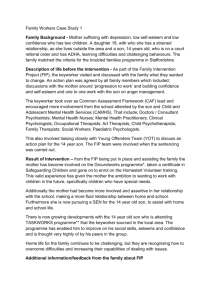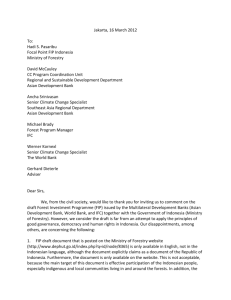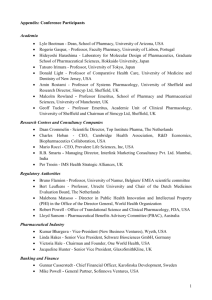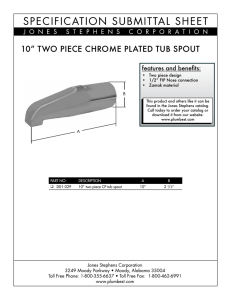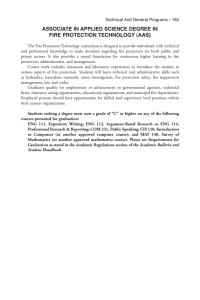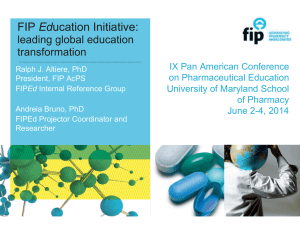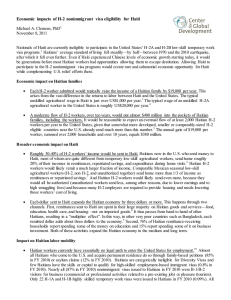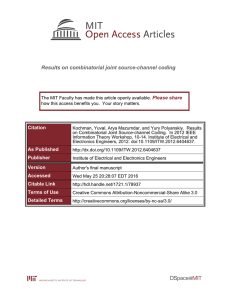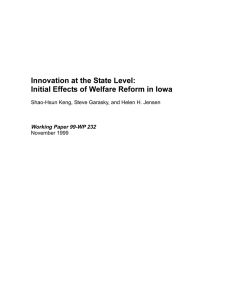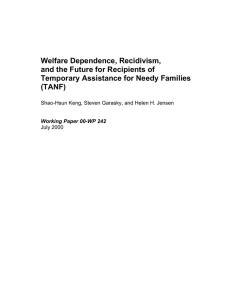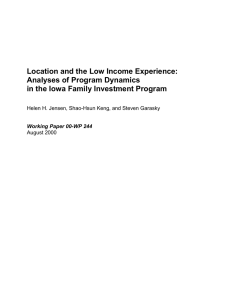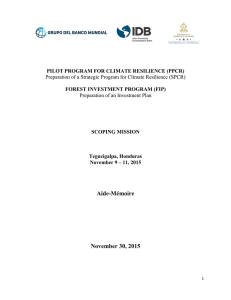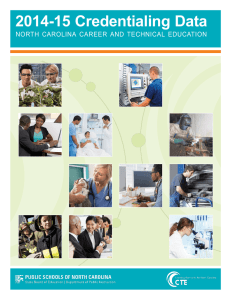Financial Improvement Plan 2013/14 * 2014/15 A summary for staff
advertisement
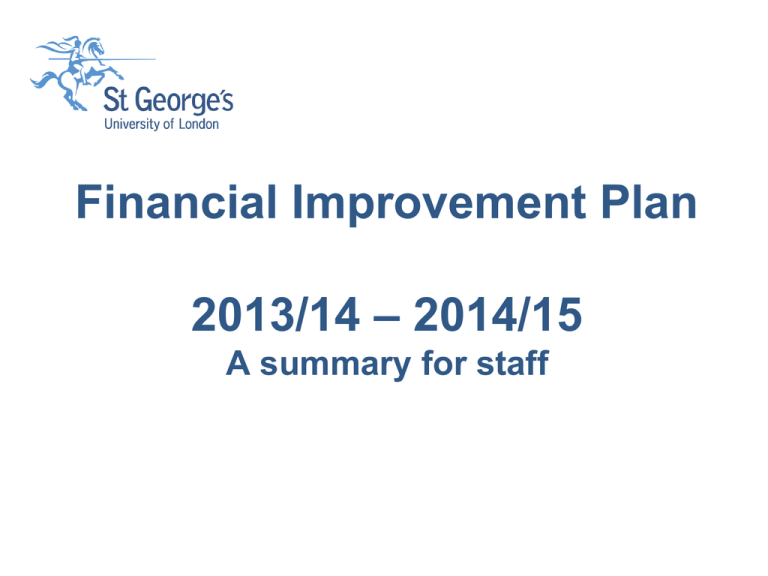
Financial Improvement Plan 2013/14 – 2014/15 A summary for staff Our strategy The financial improvement project and development of institutional priorities are taking place against the background of a refresh of the St George’s strategic plan. Three strong themes have emerged during the strategic refresh. The first is the breadth of our translational work for patient benefit. • • Translational education and training – from classroom to point of care Translational research – from bench to bedside We turn theory into practice Our strategy The second theme is the international dimension of our work: • • • • Education of international students Preparation of international students [INTO foundation] Franchising [or joint venture] overseas Research into global health issues: [antimicrobial resistance, clinical and tropical infection, HIV, malaria, vaccinology, sexually transmitted disease, tuberculosis, rabies] Our business is the health of nations. Our strategy The third theme is our partnership and collaborative way of working: • • • • • • St George’s Healthcare NHS Trust Kingston University South West London System University of Nicosia INTO University Partnerships Research collaborations … We are a small organisation with a long reach What is the FIP? The Financial Improvement Plan (FIP) is a programme of activity that will enable us to make both short term improvements to our financial standing and longer term sustainable change that will enable us to have a valuable and viable future fulfilling our mission: To advance, promote and share knowledge through excellence in teaching, clinical practice and research into the prevention and treatment of illness Why do we need to do this? St George's, University of London has been operating at breakeven for a number of years. In an increasingly challenging and competitive environment this is not sustainable. The reduction in government grants has not been replaced by large number so new students and like many similar organisations we need to look at where we can modernise how we deliver, as well as where we can grow. We need to deliver a major financial improvement so that we have the resilience to meet future challenges and exploit potential opportunities. This is about ensuring we deliver a surplus in this financial year and in 2014/15 and maintaining our £2m capital programme so we can invest where necessary. Haven’t we already made savings this year? Much has been achieved. The Strategic Futures programme has released savings of around £1.5m – and a further £700K has been identified and part delivered to support us ending the year with a surplus. These are huge achievements everyone should be proud of the dedication and commitment – as well as the ingenuity and innovation – that we have shown in meeting these challenges. We have restructured the organisation into institutes that have strengthened our ability to deliver swift improvements in both education and research, and new courses are being planned and scoped, which give us a good basis for growing our income in future years. However, we still have a considerable challenge ahead. As well as delivering the savings identified this year we need to generate a further £3m improvement in 2014/5. Why do we say ‘financial improvement’? It may sound like management jargon but there is a very good reason why the term financial improvement is being used. This is as much about income generation as it is about efficiencies or savings– instead of savings or cuts. At its most simplest we can improve our financial standing in two ways : o Most crucially by generating more income and o By identifying savings and efficiencies that reduce our costs At St George’s, University of London we have a lot of important and valuable assets – these include: o Our intellectual capital – ie the expertise and innovation of our staff o Our commercial interests o Our site and the way we maximise its use o Our partnerships – in particular our relationships with Kingston University and St George’s Healthcare NHS Trust. Who is ‘doing’ the FIP? The Financial Improvement Programme is led by the senior management team but is already involving colleagues from all levels and areas in St George's. It will impact on all of us and everyone needs to contribute in a number of ways: o o o Supporting projects that impact on your area with your expertise and good ideas. Putting forward ideas to your line manager to make processes in your area more efficient, or new ways to generate income And of course - by being aware of the resources we are using: o Reduce the amount of copying and printing o Turn off lights and equipment at the end of the day What is actually happening through the FIP? Some projects are already underway as they have been identified as simple and effective ways to improve our financial standing and will ensure we deliver a small surplus in this financial year. Other ideas and initiatives are under discussion. They are being scoped by the teams they impact on. Decisions as to whether these go forward rests with the senior team – but once a decision has been made projects will need the support and input of a wide range of staff. What is the end date for the FIP? The FIP will need to achieve to deliver £850K in this financial year – and plans need to be in place to ensure a further £3m improvement can be delivered for next financial year. However, the process and discipline of this approach is something that can benefit us for much longer. We will need to develop new ways of working that allow us to be more flexible and responsive to a rapidly changing external environment. Budgets for 2014/15 will be set in July but work implementing the programme will continue throughout the year. Won’t this require some investment? The improvements we have identified take into consideration the need to make sure there are funds available for targeted investment and contingencies. For the coming year this needs to be kept to a minimum given the scale of the immediate challenge. The people at St George’s are the greatest asset the organisation has and we need to develop new ways of tapping into the energy and ingenuity, and moving new ideas forward quickly and effectively. We are looking at organisational development and how we can help encourage and embed changes in a way that supports staff and teams to make the most out of new opportunities – be that gaining new skills; being part of a change for the better; or taking on leadership of work that has organisational impact. COMPLETED IMPROVEMENTS 2013/2014 Work has been underway since early April and already a significant improvement has been generated o Improved joint faculty returns o Greater return for the SGUL contribution to Kingston University’s MPharm o Improved returns from UNic due to greater student numbers from UNic franchise These have collectively released £380K of financial improvement. CURRENT IMPROVEMENTS Project Improvement target Sale of property £350K Estates cost recovery from SGHT TBC Non discretionary expenditure freeze £280K Delays in staff recruitment TBC REF investment supported through ISSF £90K Our strategic priorities in Research are: Sustainability, by • developing the strategy for grant funding • increasing the proportion of overhead recovery • prioritising the research with the greatest value Focus through determining: • how much research can be afforded and address the deficit • where ambition and growth should be supported • where disinvestment is required in order to support ambition and growth Partnerships: determine who we need to work with to achieve this RESEARCH INITIATIVES Planned improvements Better grant construction – increased recovery of overhead costs ISSF funding set against existing costs Investment in research “stars” Review of unfunded research Non-pay savings from institute purchasing Core facilities cost review Equipment Users’ Committee Our strategic priorities in Education are: Growth, through portfolio review and expansion – new and existing programmes internationalisation in more than one form Efficiency through curriculum review resource review Creativity and innovation in developing training for new healthcare roles – eg generalist rather than specialist in training for new modes of healthcare delivery – eg telehealth Partnership: determining who we need to work with to achieve this EDUCATION INITIATIVES Planned improvements Growth in current student numbers Internationalisation Portfolio development Teaching capacity review The strategy for Support Services is to increase efficiency by: exploring innovative ways to deliver services through partnerships determining the right balance between centralisation and devolution increased targeting of service objectives in support of our overall strategy PROFESSIONAL SERVICES INITIATIVES Planned improvements Review of MBBS across IMBE and Registry Review of student selection processes Admin review of research support Invest in fibre optic cable Review potential for shared services with Kingston University ESTATES INITIATIVES Planned improvements Cost & utilisation of space Shared services Income generation Utility costs Questions? Comments? Suggestions? Your contribution in energy, innovation and dedication is welcomed. If you would like to raise a question or put forward a suggestion please talk to your line manager or email the fip team directly at fip@sgul.ac.uk
